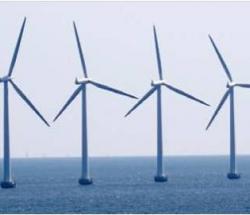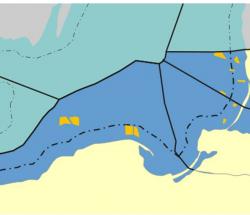| Brief description |
The development of wind energy production in the Baltic Sea coastal zones of three neighbouring countries: Lithuania, Poland and the Russian Federation
|
|---|---|
| Region | External EU borders |
| Countries | Lithuania (LT) – Poland (PL) – Russian Federation (RU) |
| Location | Offshore areas of Lithuania (LT), Poland (PL) and Kalliningrad Oblast (RU) |
| Type of project partners | Regional government units Educational institutions |
| Size (total budget including EU grants) | Over € 500,000 |
| Main themes | Research, technological development, innovation and ICT Environmental protection, climate change and risk prevention |
| Keywords (Types of Activities) | Research and studies |
| Keywords (Aspects of Good Practice) | Genuine cross-border dimension Genuine cross-border impact Good dissemination Good sustainability |
| Background and Objectives | The main goal of the project was to create conditions for the effective development of wind energy production in the Baltic Sea coastal zones of three neighbouring countries: Lithuania, Poland and the Russian Federation. Use of renewable energy sources, including wind, is an important aspect of the sustainable development of these regions, which may result in measurable positive economic, ecological and social outcomes. |
|---|---|
| Main activities | The activities of the project took place in three stages.
The first stage focused on studies leading to the delimitation of areas fulfilling environmental and technical requirements for wind farm construction (bathymetry, geological and hydro-meteorological conditions). A parallel study on possible connections to existing power network systems was also undertaken. The possibility of interconnection of Lithuanian, Polish and Russian power networks with high capacity links was analysed (including evaluation of existing and planned connections to Sweden). These activities were followed by an analysis of potential use conflicts (Natura 2000 areas, mining licenses, military areas, navigation routes, submerged cables and pipelines, fishing grounds, etc.), which significantly limit areas suitable for offshore wind farm development. The second stage mainly consisted of an economic feasibility study, taking into account the local meteorological potential for wind power production. The direct outcome of this study was a map showing the most suitable areas for both construction and operation of wind farms. A workshop promoting the map amongst potential investors was organised. An important action during this stage was the publication of multi-lingual brochures explaining the advantages of offshore wind energy production. The third stage revolved around pilot studies in three areas (one in each of the participating countries). The pilot studies included supplementary environmental surveys (bathymetry, geology, natural resources and environmental impact assessment) and the development of model potential wind farms. The cross-border impact of each of the three selected areas was evaluated and the legal framework on the procedure for application to construction permits was examined according to national legislation in each of the three countries. |
| Main results | All the results emanating from the project activities were disseminated to the public through publications and on the internet. The project concluded with a series of final workshops in each of the countries, aimed at building the capacity of local and central authorities and agencies involved in decision making processes leading to building permits for offshore wind farms.
Overall, the project created more favourable conditions for increasing the contribution of electricity produced from wind farms to the gross electricity consumption of the three countries. Regarding the attraction of investment in offshore wind power, the project contributed by providing:
The project also established and strengthened scientific and technical co-operation among research institutions from the three participating countries. |
| Aspects of good practice |
The project should have significantly helped to achieve the renewable energy targets stated in the accession treaties of Poland and Lithuania. Besides, the co-operation that started within the project at various levels, encompassing local, regional and central authorities, industry associations and research organisations, resulted in a better understanding among partners from participating regions with long-term benefits. The outcomes of the project contributed to the generation of coherent spatial management plans for all marine frontier areas and made it possible to take into consideration, in planning decisions, not only the interests of one country, but also those of neighbouring countries. This reflects the fact that borders between marine ecosystems of neighbouring states practically do not exist, and the environmental effects of possible disasters do not recognise borders between states. |
| Start and completion dates: |
April 2006 -March 2008
|
| More information | http://www.corpi.ku.lt/power/index.php |
| Lead Partner | Klaipeda University, Coastal Research and Planning Institute (LT)
H. Manto 84, LT-92294, Klaipeda, Tel. No. +370 46 39 88 48, Fax No. +370 46 39 88 45 |
|---|---|
| Partner | Maritime Institute in Gdańsk (PL)
Dlugi Targ, 41-42, PL 80-830, Gdansk, Tel. No. +48 58 3013718, Fax No. +48 58 3203256 |
| Partner | Atlantic Branch, Institute of Oceanology, Russian Academy of Sciences (RU)
Pr. Mira, 1, 236000, Kaliningrad, Tel. No. +7 (4012) 530127, Fax No. +7 (4012) 530127 |
| Partner | Strategic Self-management Institute (LT)
Baltijos str. 123-61, Klaipėda, Tel. No. + 370 46 350560, Fax No. +370 46 350560, ssi@eksponenete.lt |
| Partner | Maritime Office in Gdynia (PL)
Chrzanowskiego 10, 81-338 Gdynia, Tel. No. (+48)(58) 620 69 11 ext. 570, Fax No. (+48)(58) 661 66 97 |
| Partner | Polish Wind Energy Association (PL)
Królowej Jadwigi 7/1, 81-765, Sopot, Tel. No. (58) 550 49 33, Fax. No. (58) 550 49 33 |
| Partner | Klaipėda County Governor’s Administration (LT)
Danes str. 17, LT-92117, Klaipeda, Tel. No. + 370 46 312940, Fax No.+ 370 46 310667 |



